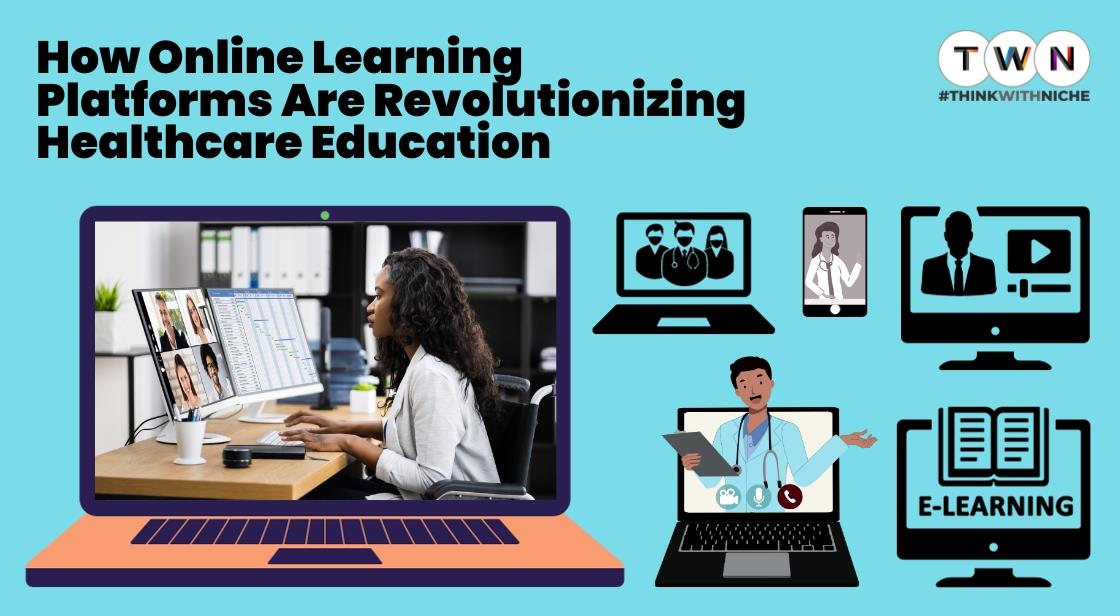How Online Learning Platforms Are Revolutionizing Healthcare Education

Blog Post
The landscape of healthcare education is undergoing a remarkable transformation, driven by the widespread adoption of online learning platforms.
These platforms have not only revolutionized the way healthcare professionals access training and certifications but also significantly improved the overall quality of education in the field.
With the global e-learning market on a rapid growth trajectory, online healthcare education is poised to become a cornerstone of workforce development and skill enhancement in the healthcare sector.
In this blog post, we delve into the key advantages, accessibility, inclusivity, and features of online learning platforms tailored for healthcare education.
Moreover, we explore how healthcare learning management systems are reshaping the delivery of training content, leading to a more engaged and skilled healthcare workforce.
Finally, we discuss the critical elements that ensure the effectiveness of online learning platforms and how they are set to redefine the future of healthcare education.
The growing importance of online learning platforms in healthcare education has led to immense innovation and advancement in the field. With their widespread accessibility and inclusivity, online learning platforms have become invaluable tools for providing training, certifications, and development opportunities to healthcare professionals around the world.
According to recent reports, the global e-learning market size was valued at $250 billion in 2020 and is projected to reach over $375 billion by 2026, demonstrating the enormous growth and demand in this sector.
There are numerous advantages to utilizing online learning platforms for healthcare education. The most significant of these is the level of flexibility and convenience afforded to learners.
Healthcare professionals can access training anytime and anywhere through mobile learning, allowing them to fit education around demanding work schedules.
As 77% of healthcare organizations now use online learning to train employees, it has quickly become an essential method for workforce development. Additionally, healthcare online learning can reduce costs associated with in-person training and education by limiting travel expenses.
With careful implementation that focuses on engagement, accessibility, and compliance guidelines, online learning platforms show immense promise for revolutionizing how healthcare professionals receive training and further their skills.
The following sections will explore the key ways online education is impacting and improving healthcare workforce training and development across organizations and roles.
How Online Learning Platforms Are Revolutionizing Healthcare Education
Accessibility and Inclusivity in Healthcare Education
A major advantage of online learning platforms is their ability to provide inclusive and accessible healthcare education opportunities. This is incredibly important given the diversity of professionals in the healthcare workforce.
Online platforms like United Medical Education provide critical training and certifications, like Advanced Cardiac Life Support (ACLS), to learners across multiple locations and shifts. Additionally, e-learning content can be created to adhere to accessibility guidelines and regulations to accommodate different learning needs and disabilities.
For example, healthcare learning management systems integrate features like closed captioning, screen reader capabilities, and interface customization to create accessible online learning environments compliant with ADA regulations.
The flexibility of self-paced online courses provides accommodations for professionals who require additional time or alternative formats to comprehend new material. According to one survey, 93% of nurses reported online education makes learning more flexible for their demanding and variable schedules.
Healthcare organizations that leverage online learning can train diverse workforces with varying needs, languages, disabilities, and professional roles.
This allows them to develop inclusive cultures focused on equipping all professionals with the requisite knowledge and skills for providing quality care, regardless of their individual needs and limitations. As online education expands, ensuring accessibility and inclusivity will be key considerations for healthcare learning platforms.
Features of Healthcare Learning Management Systems
Healthcare learning management systems (LMS) provide robust platforms for managing and delivering online education to professionals. These systems include customizable features and functions designed specifically for healthcare organizations' training needs.
A core feature of healthcare LMS platforms is role-based learning assignments and scheduling. Administrators can assign customized training content and schedules to employees based on their roles and responsibilities.
For example, nurses can automatically be enrolled in courses for new clinical guidelines or procedures, while billing staff are assigned relevant updates on coding and regulations.
Healthcare LMS platforms also allow for automated training alerts and notifications. This helps ensure healthcare professionals stay compliant with organizational and regulatory training requirements. Systems like HealthStream track employee certifications and credentials, sending reminder alerts when renewal is required.
To enhance engagement, leading healthcare LMS platforms integrate interactive multimedia formats. Video lectures, 3D simulations, gamification, and virtual reality provide immersive online learning experiences.
Quizzes, discussions, and assessment tools allow educators to track learner progress and gaps. With their robust functionality and customizability, healthcare learning management systems enable organizations to provide targeted, interactive, and effective online education.
Also Read: Cloud Computing Training in Healthcare: Transforming the Industry
Advantages of Online Learning Platforms in Healthcare Education
Transitioning to online learning platforms provides immense advantages for healthcare education and professional development. The benefits apply to both individuals and organizations.
For healthcare professionals, online learning means convenient access to continued education and training opportunities. Rather than needing to take time off to attend conferences or travel for multi-day in-person courses, online platforms allow learning to fit around existing schedules.
This results in less time away from work and patients. Additionally, the self-paced online environment accommodates different learning speeds and styles.
Online platforms also lead to faster completion of mandatory certifications and reduced costs. According to recent estimates, healthcare professionals saved an average of $1,100 per year by using online instead of in-person training.
For organizations, advantages include lower expenses related to employee travel and training facilities. Online learning also provides helpful analytics on learner performance and knowledge gaps to refine education programs.
With heavy workloads and time limitations, online learning gives healthcare professionals flexible and convenient ways to maintain expertise and progress their careers. For healthcare organizations, e-learning platforms help drive productivity by keeping workforces compliant, certified, and skilled in the latest clinical practices and technologies.
Ensuring the Effectiveness of Online Learning Platforms in Healthcare Education
Maximizing online learning platform effectiveness in healthcare education requires focusing on key elements:
- User-Friendly Interface Design - Simple, intuitive navigation promotes engagement with course materials.
- Interactive Learning Tools - Assessments, discussions, simulations, etc. enhance information retention and comprehension.
- Accessibility Compliance - Platforms must meet standards and regulations for accommodating disabilities.
- Performance Analytics - Platform analytics identify gaps to refine programs and boost outcomes.
By optimizing these critical factors, healthcare organizations can ensure professionals receive the full benefits of online education for impactful skill and knowledge development.
Conclusion
In conclusion, online learning platforms are profoundly impacting healthcare education by increasing accessibility, flexibility, and affordability. Their customizable features cater efficiently to diverse learning preferences, schedules, and needs.
Healthcare professionals and organizations gain immense advantages from e-learning systems' capabilities to lower costs, drive standardized training, and provide robust analytics.
Current adoption trends show healthcare education will become increasingly digitized moving forward. However, careful implementation focused on engagement, accessibility, and desired outcomes is necessary to ensure online learning realizes its full potential.
As technology progresses, platforms will become even more immersive and customized. By harnessing these innovations while addressing areas for improvement, online learning can successfully revolutionize how the healthcare workforce accesses the high-quality education necessary to provide exceptional patient care.
You May Like
EDITOR’S CHOICE












